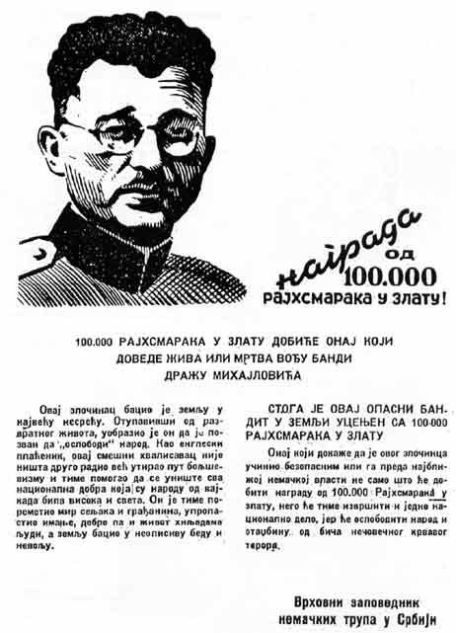On 11 June, a Belgrade court began questioning Chetnik leader Dragoljub “Draža” Mihajlović.
A clash with the German war machine in April 1941 resulted in the total defeat of the Royal Yugoslav Army in 11 days, and on 17 April, the command surrendered. Colonel Dragoljub Mihajlović urged the soldiers not to capitulate. On 6 May, under the salvaged banner of the 41st Infantry Regiment with the volunteers who had joined them, on the summit of Mount Tara, Mihajlović held a celebration of Saint George's Day, known as Đurđevdan, when Balkan partisans remember the Hajduči (Balkan irregular infantry) who fought Turkish domination. Since then, Mihajlović’s Balkan militia have been called Chetniks. Mihajlović set up his headquarters on the plateau of Ravna Gora, from where he coordinated the organisation of sabotage, intelligence and reporting systems.
In the summer of 1941, Communist leader Josip Broz Tito began to form the Yugoslav National Liberation Army, officially the National Liberation Army and Partisan Detachments of Yugoslavia. The Chetniks and Communists allied against the occupiers, but as early as November, ideological friction led to a civil war. In addition to fighting the Communists and the German and Italian occupiers, the Chetniks fought Ustasha (Croatian fascists) and other collaborators. Already in 1942, the Chetniks controlled large parts of the country. The Yugoslav government in exile recognised Mihajlovic as commander of the Yugoslav People’s Army. The Nazis put a price on Mihajlović’s head of 100,000 gold marks.
However, Tito and his Yugoslav National Liberation Army enjoyed wider popular support, and gradually the Allies also shifted to relations with him. In 1945, most of the Chetniks were driven out of the country; Mihajlović refused to leave the country, and was arrested on 13 March 1946, near Visegrád.
Mihajlović and 10 others were predictably sentenced to death. The judges would disregard the testimony of 500 rescued Allied pilots, foreign soldiers and officers who had fought beside Mihajlović. Despite Western condemnation, the sentence would be carried out. The decision to rehabilitate Draža Mihailović would be made only on 14 May 2015 by the High Court in Belgrade. The ruling reversed the judgment passed in 1946, sentencing Mihailović to death for collaboration with the occupying Nazi forces and stripping him of all his rights as a citizen.
Source:
Alexey Timofeev, “Chetniks. The Royal Army”, Moscow: Veche, 2012.
























